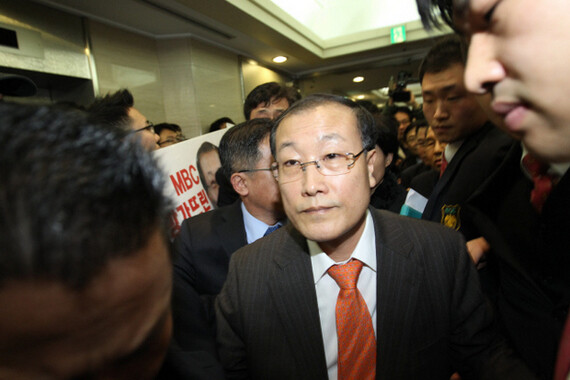hankyoreh
Links to other country sites 다른 나라 사이트 링크
Strikes dragging on at major broadcasters

By Kwon Kwi-soon
"If Kim In-kyu doesn't step down, the strike will continue until the general election. While the strike is going on, we will be engaging in online election broadcasting with the MBC union to help South Koreans with their determinations, including verification of election pledges, which won't be covered on the terrestrial networks.”
These were the words of Kim Hyeon-seok, head of the new union for the KBS network. That union, a chapter of the National Union Of Media Workers, plans to follow in the footsteps of MBC, where a strike has been ongoing since Jan. 30, by launching its own production boycott as of March 5. Difficulties in broadcasting for the two leading terrestrial networks are already apparent. With little common ground between labor and management at either, observers are predicting the problems will continue into their general election reporting.
The union at YTN, another news channel, is hinting at a boycott of its own, holding a vote for a strike to demand the resignation of the network's president.
At a meeting of its dispute measures committee Friday afternoon, the KBS union announced that it would begin a strike at 5 am on Mar. 6 to demand the resignation of network president Kim In-kyu and the reversal of disciplinary measures against members of the union's former executive. The emergency measures committee for the network's journalists' association agreed Thursday to boycott production as of midnight on Mar. 2. The network plans to respond sternly.
Bae Jae-seong, director of the KBS public information office, said, "This is an illegal strike over personnel placement and disciplinary measures, both of which are the company's prerogative, and we plan to take stern measures in response." Bae also mentioned the possibility of civil or criminal charges in connection with the production boycott decided on by the journalists' association, a voluntary group.
The boycott that is set to begin on Mar. 2 appears poised to involve around 150 of the employees in the KBS newsroom, who number roughly 300, not including trainees, employees on leave, and dispatch workers. The number of predicted participants does not include forty to fifty desk-level officials. Observers said the immediate blow is not likely to be great if the officials work on news production, but that a protracted struggle is likely to leave the network hobbled.
Hwang Dong-jin, head of the journalists' association, said, "Dissatisfaction with the unfairness of the broadcasting was shown by the high level of support for the production boycott." A total of 364 out of the 541 members voted, with 264 of them, or 72.3%, favoring the boycott.
Analysts said the journalists' boycott appears likely to drag on as the baton is handed off from the new union calling from Kim In-kyu's resignation to additional participants from members of the network's producer and technical employee unions.
Experts see a strong possibility that KBS and MBC reports on the general election will face reductions and difficulties. Both of the unions are calling for the resignation of their presidents, and have made it clear that their president has no intention of stepping down and are playing the strong card of a stern crackdown on strikes they are calling illegal.
The MBC union is saying that its members will not return to the newsroom or production department until president Kim Jae-chul resigns.
Boycotting journalists at the two networks plan to form a joint election broadcasting planning team early next month. MBC union president Jeong Young-ha said, "Reporters at both networks agreed that the terrestrial networks are unfair and biased in their reporting, and that we should do low-resolution, fair broadcast reporting online."
"We plan to offer the kind of proper broadcasting we haven't seen from the networks so far, working together to plan policy analyses, examinations of the candidates, and policy debates," Jeong added.
Please direct questions or comments to [englishhani@hani.co.kr]
Editorial・opinion
![[Column] Has Korea, too, crossed the Rubicon on China? [Column] Has Korea, too, crossed the Rubicon on China?](https://flexible.img.hani.co.kr/flexible/normal/500/300/imgdb/original/2024/0419/9317135153409185.jpg) [Column] Has Korea, too, crossed the Rubicon on China?
[Column] Has Korea, too, crossed the Rubicon on China?![[Correspondent’s column] In Japan’s alliance with US, echoes of its past alliances with UK [Correspondent’s column] In Japan’s alliance with US, echoes of its past alliances with UK](https://flexible.img.hani.co.kr/flexible/normal/500/300/imgdb/original/2024/0419/2317135166563519.jpg) [Correspondent’s column] In Japan’s alliance with US, echoes of its past alliances with UK
[Correspondent’s column] In Japan’s alliance with US, echoes of its past alliances with UK- [Editorial] Does Yoon think the Korean public is wrong?
- [Editorial] As it bolsters its alliance with US, Japan must be accountable for past
- [Guest essay] Amending the Constitution is Yoon’s key to leaving office in public’s good graces
- [Editorial] 10 years on, lessons of Sewol tragedy must never be forgotten
- [Column] A death blow to Korea’s prosecutor politics
- [Correspondent’s column] The US and the end of Japanese pacifism
- [Guest essay] How Korea turned its trainee doctors into monsters
- [Guest essay] As someone who helped forge Seoul-Moscow ties, their status today troubles me
Most viewed articles
- 1[Column] The clock is ticking for Korea’s first lady
- 2Samsung barricades office as unionized workers strike for better conditions
- 3[Editorial] When the choice is kids or career, Korea will never overcome birth rate woes
- 4[News analysis] After elections, prosecutorial reform will likely make legislative agenda
- 5S. Korea, Japan reaffirm commitment to strengthening trilateral ties with US
- 6All eyes on Xiaomi after it pulls off EV that Apple couldn’t
- 7After 2 months of delayed, denied medical care, Koreans worry worst may be yet to come
- 8US overtakes China as Korea’s top export market, prompting trade sanction jitters
- 9[Column] Has Korea, too, crossed the Rubicon on China?
- 10Hong Se-hwa, voice for tolerance whose memoir of exile touched a chord, dies at 76